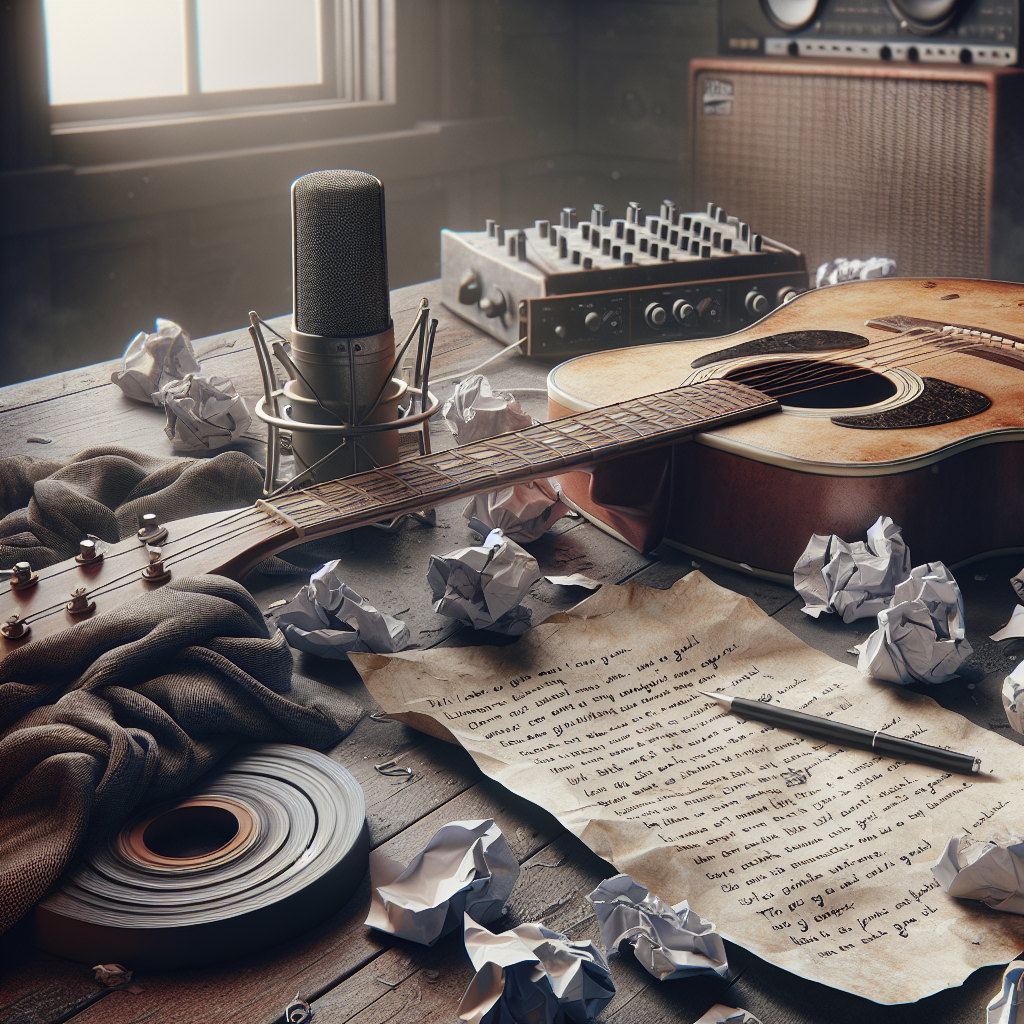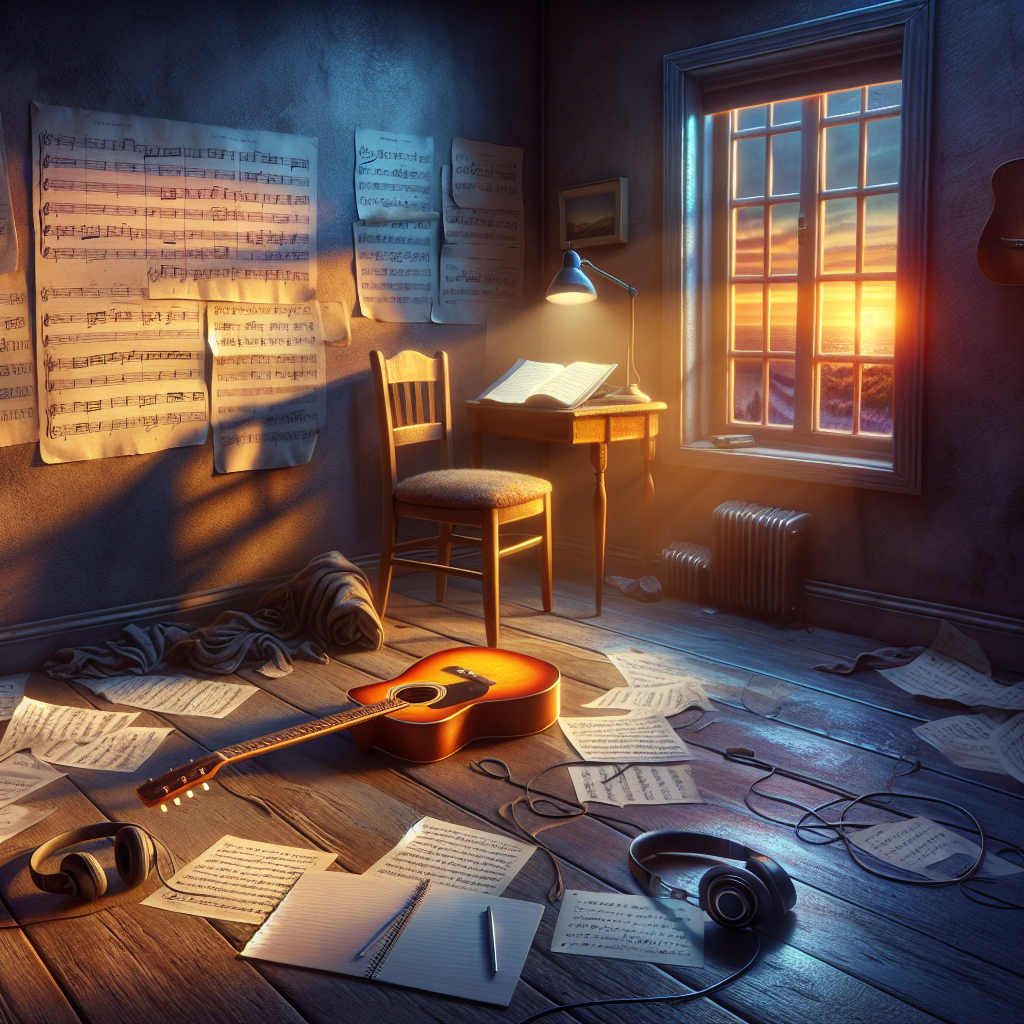
Conquering Self-Doubt For Songwriters
In the realm of music creation, where emotions serve as both the inspiration and the obstacle, songwriters often find themselves navigating a tumultuous sea of self-doubt. The journey to create can be hindered by a cascade of doubts and insecurities. In this blog post, we delve into the depths of emotional barriers that can deter songwriters from pursuing their craft, and explore how acknowledging and challenging these feelings can pave the way for artistic growth. Conquering Self-Doubt For Songwriters:
Personal Story
Imagine yourself sitting in front of a blank sheet of paper, guitar in hand, with a mind overflowing with melodies waiting to be voiced. Yet, amidst the silence, the whispers of self-doubt begin to unravel the creative thread. The doubts manifest in phrases like "I am not talented enough," "Maybe this song isn't good," or "What if no one appreciates my music?" These thoughts, seemingly innocuous at first, can snowball into a formidable barricade blocking the path to musical expression.
Emotional Reasons for Giving Up
Self-Doubt : The insidious voice of self-doubt often whispers insinuations of inadequacy. As a songwriter, it's easy to fall prey to notions of not being good enough or lacking the necessary talent. Recognizing these thoughts is the first step towards disempowering them.
Lack of Confidence : Confidence is the heartbeat of creativity. When doubts overshadow self-assurance, the spark that ignites musical brilliance diminishes. Building confidence involves a journey of incremental victories and learning to embrace imperfections as stepping stones towards excellence.
Feeling Not Talented or Gifted : Comparisons to musical icons or peers can breed feelings of inadequacy. It's crucial to remember that each songwriter possesses a unique voice, a distinct narrative waiting to be shared. Embrace your authenticity, for therein lies the true essence of your art.

Challenging the Emotional Roadblocks
Embrace Vulnerability : Vulnerability is the birthplace of creativity. By acknowledging and accepting your fears and doubts, you transform them into catalysts for authenticity. Embrace vulnerability as a conduit for profound storytelling.
Seek Support : Music thrives within a community. Connect with fellow songwriters, seek mentorship, and share your struggles. Surround yourself with individuals who nurture your creativity and offer constructive feedback, bolstering your resolve in moments of uncertainty.
Celebrate Small Wins : The path to musical mastery is lined with incremental victories. Celebrate the completion of a verse, the harmony you've crafted, or the emotion your melody evokes. By cherishing these moments, you illuminate the path ahead, infusing your journey with purpose and joy.

In Conclusion
As a songwriter, the journey through emotional roadblocks is as integral to your growth as the melodies you compose. Challenge your doubts, embrace vulnerability, and celebrate your unique voice. Your music is a tapestry woven from the threads of your experiences and emotions. In the symphony of life, your song deserves to be heard.
Let the harmony of self-belief drown out the cacophony of self-doubt. Your music is a beacon of light in the sea of emotions. Embrace the journey, for within the notes and lyrics lies the essence of who you are—a songwriter on a quest for truth and beauty.
Unveil your melody to the world, and watch as your resilience transforms doubts into lyrical prose, illuminating the path for fellow songwriters along the way.
May your songwriting journey be a testament to the triumph of the human spirit over the shadows of self-doubt.
So, dear songwriter, pick up your pen, strum your strings, and let your music be the anthem of your unwavering spirit.
Relevant Video:
FAQ: Conquering Self-Doubt for Songwriters
1. What is self-doubt, and why do songwriters experience it?
Answer: Self-doubt is the feeling of uncertainty about one’s abilities, skills, or worth. For songwriters, it can stem from fears of not being “good enough,” worrying that their songs aren’t original, or comparing themselves to more experienced musicians. It’s a common part of the creative process but doesn’t have to hold you back.
2. How can I stop comparing myself to other songwriters?
Answer: Comparing yourself to others is natural but can be damaging. Here’s how to overcome it:
Focus on your unique voice: Every songwriter has their own perspective and style. Embrace what makes your songs distinct.
Limit social media exposure: Constantly seeing others’ successes can amplify self-doubt. Reduce time spent scrolling through others’ work to focus more on your own creativity.
Remind yourself of progress: Reflect on how far you’ve come, not just where others are. Celebrate small wins in your songwriting journey.
3. What can I do if I feel like I’m stuck and can’t write anything good?
Answer: It’s normal to experience writer’s block, but there are ways to push through:
Write daily: Even if you don’t feel inspired, try writing something every day, even if it’s just a few lines or a melody idea. The practice keeps your creativity flowing.
Try freewriting: Set a timer for 10-15 minutes and write anything that comes to mind, without worrying about structure or quality. This can help release pent-up creativity.
Change your environment: Sometimes, a change of scenery or routine can help spark new ideas.
Collaborate: Working with another songwriter can provide fresh perspectives and help you break through mental blocks.
4. How do I handle negative feedback on my songs?
Answer: Negative feedback can be tough, but it’s an opportunity for growth:
Separate yourself from your work: Remember that criticism is about the song, not about you as a person or a songwriter.
Focus on constructive feedback: Look for useful advice in the feedback that can help improve your writing. Ignore vague or harsh criticism that isn’t specific or actionable.
Ask questions: If feedback feels unclear, ask for specific examples or suggestions to help you understand how you can improve.
Use it as fuel: Channel any negative feedback into motivation to improve and try new approaches.
5. How do I stop worrying about my songs not being "good enough"?
Answer: Many songwriters struggle with perfectionism, but here’s how to overcome the fear of not being good enough:
Trust the process: Songwriting is a journey, and not every song will be a masterpiece. Allow yourself to experiment, make mistakes, and learn from them.
Focus on expression, not perfection: The most powerful songs often come from genuine emotion and raw expression, not from being perfectly crafted.
Share early drafts: Don’t wait until your song is “perfect” to share it with others. Sharing work-in-progress versions can help you build confidence and get feedback to improve.
6. How can I overcome the fear of failure in songwriting?
Answer: Fear of failure can paralyze creativity, but it doesn’t have to:
Embrace mistakes: Understand that failure is a part of the learning process. Every “failed” song or idea can teach you something valuable.
Set small, achievable goals: Instead of aiming for a perfect hit song right away, focus on completing small tasks—like writing a verse or completing a chorus—so you build momentum and confidence.
Reframe failure: View each setback as an opportunity to improve. Learning from your “failures” is a step toward eventual success.
7. How do I develop confidence in my songwriting abilities?
Answer: Confidence in songwriting comes with practice and self-reflection:
Celebrate your successes: Acknowledge your songwriting achievements, even if they feel small. Completing a song, finishing a verse, or getting positive feedback are all victories.
Create a routine: Writing regularly helps you feel more confident in your skills. Set aside time each day or week to write, even if it’s just for fun.
Trust your instincts: Start trusting your gut feelings and natural instincts while writing. Don’t second-guess yourself too much. Confidence grows when you take ownership of your creative choices.
8. How do I deal with the pressure of writing hit songs?
Answer: The pressure to write a hit song can be overwhelming, but it’s important to focus on the art:
Don’t chase trends: Focus on writing songs that are true to your voice rather than trying to follow popular trends. Authenticity often resonates more with listeners.
Enjoy the process: Instead of fixating on the outcome, focus on enjoying the act of songwriting. This shift in mindset can reduce the pressure.
Let go of expectations: Accept that not every song has to be a chart-topping hit. Write for the love of the craft, and the rest will follow.
9. How can I silence my inner critic while writing songs?
Answer: Your inner critic can be an obstacle, but here are ways to quiet it:
Write without judgment: Set aside time to write without worrying about how good or bad it sounds. The goal is simply to get ideas down.
Challenge negative thoughts: When your inner critic speaks up, remind yourself that it’s okay to be imperfect and that every songwriter has moments of self-doubt.
Practice self-compassion: Treat yourself with kindness and patience, as you would with a fellow songwriter. Understand that it’s normal to struggle and that it doesn’t mean you aren’t talented.
10. What can I do to stay motivated when facing self-doubt?
Answer: Staying motivated despite self-doubt requires consistency and a positive mindset:
Set achievable goals: Break your songwriting process into smaller, manageable tasks to avoid feeling overwhelmed.
Find support: Surround yourself with other songwriters, musicians, or creative individuals who can encourage and inspire you.
Remember your purpose: Reconnect with the reasons you started songwriting in the first place. Whether it's to express yourself, connect with others, or share a message, focusing on your "why" can reignite your passion.
11. How do I keep going when I feel like I’m not improving as a songwriter?
Answer: Improvement takes time, so be patient with yourself:
Track progress: Look back at your old songs to see how far you’ve come. You’ll likely notice growth in your writing and technique.
Practice consistently: Like any skill, songwriting improves with regular practice. Commit to writing regularly, even when it feels challenging.
Learn from others: Study other songwriters you admire, attend songwriting workshops, and collaborate with others to learn new techniques and approaches.
12. Should I give up songwriting if I feel too discouraged?
Answer: It’s normal to feel discouraged at times, but giving up may not be the best solution:
Take a break: If you're feeling burnt out, step away from songwriting for a while. Sometimes, a break can help clear your mind and allow you to come back with renewed creativity.
Remember why you started: Reflect on what drew you to songwriting in the first place. Rekindle your passion for the art, and let that drive you forward.
Seek inspiration: Listen to music, read poetry, or take a walk to find new sources of inspiration. Inspiration can often be found in the most unexpected places.
Suggested Reading:

Comments